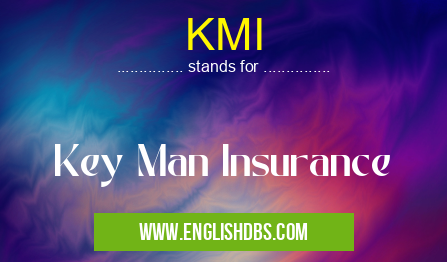What does KMI mean in COMPANIES & FIRMS
KMI (Key Man Insurance) is a type of life insurance policy that protects a business against the financial impact of the death of a key employee. Key employees are those individuals who are essential to the success of the business, such as executives, managers, and technical experts.

KMI meaning in Companies & Firms in Business
KMI mostly used in an acronym Companies & Firms in Category Business that means Key Man Insurance
Shorthand: KMI,
Full Form: Key Man Insurance
For more information of "Key Man Insurance", see the section below.
What KMI Covers
KMI typically covers the following:
- Lost revenue: The business may lose revenue if the key employee is unable to perform their duties.
- Increased expenses: The business may incur additional expenses, such as hiring and training a replacement employee.
- Damage to reputation: The death of a key employee can damage the business's reputation and customer relationships.
How KMI Works
KMI is purchased by the business, with the key employee as the insured individual. The business pays the premiums and is the beneficiary of the policy. If the key employee dies, the business receives a death benefit that can be used to cover the financial losses associated with their death.
Benefits of KMI
KMI provides several benefits to businesses, including:
- Financial protection: KMI provides financial protection against the unexpected death of a key employee.
- Peace of mind: KMI gives business owners peace of mind knowing that their business will be financially protected in the event of a key employee's death.
- Attracting and retaining key employees: KMI can be used to attract and retain key employees by demonstrating that the business values their contributions.
Essential Questions and Answers on Key Man Insurance in "BUSINESS»FIRMS"
What is Key Man Insurance?
Key Man Insurance (KMI) is a type of life insurance policy designed to protect a business from financial losses caused by the death or disability of a key employee or executive. It provides a payout to the business upon the covered person's death or disability, which can be used to cover lost revenue, recruit and train a replacement, or pay off debts.
What are the benefits of Key Man Insurance?
Key Man Insurance offers several benefits, including:
- Financial protection for the business in the event of the insured person's death or disability.
- Coverage for lost revenue, expenses, and debts.
- Peace of mind for business owners and shareholders knowing that the business is financially secure.
Who should consider Key Man Insurance?
Any business that relies heavily on a few key individuals should consider Key Man Insurance. This includes businesses such as:
- Small businesses with a limited number of key employees.
- Professional service firms where the founder or lead partner is essential to the business's success.
- Family-owned businesses where a family member plays a crucial role.
How much Key Man Insurance do I need?
The amount of Key Man Insurance you need depends on several factors, including:
- The financial impact of losing the insured person.
- The size and profitability of the business.
- The length of time it would take to replace the insured person. It's important to work with an insurance professional to determine the appropriate amount of coverage.
What are the tax implications of Key Man Insurance?
Key Man Insurance premiums are typically tax-deductible for the business. However, the death benefit is generally not taxable to the business or the insured person's beneficiaries.
Final Words: KMI is an important tool for businesses that want to protect themselves against the financial impact of the death of a key employee. By providing financial protection, peace of mind, and the ability to attract and retain key employees, KMI can help businesses maintain their stability and success.
